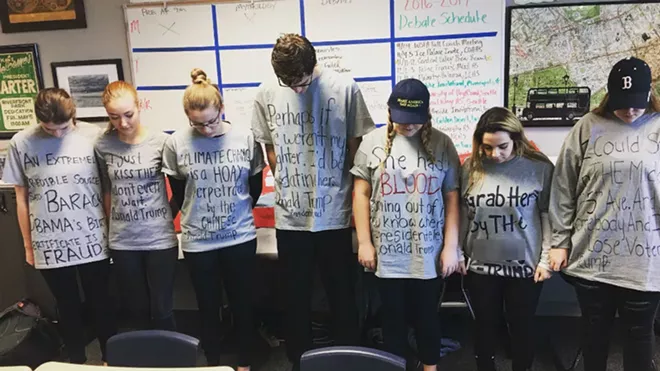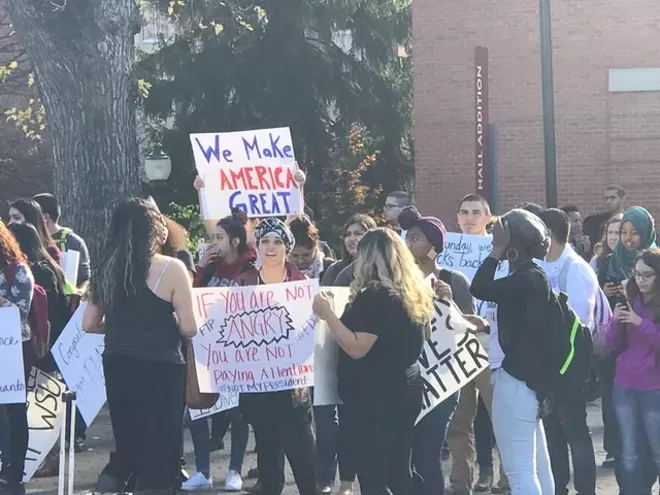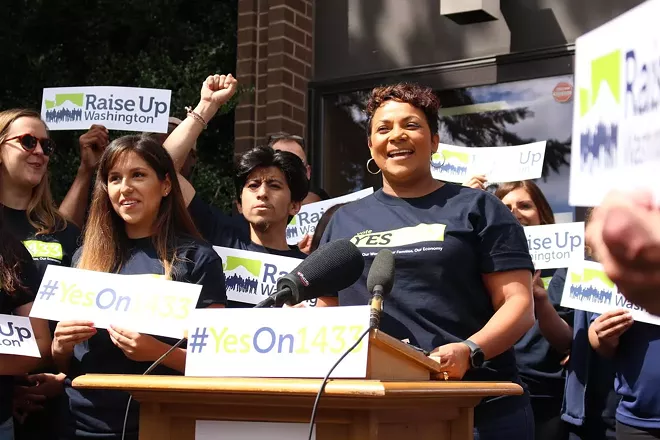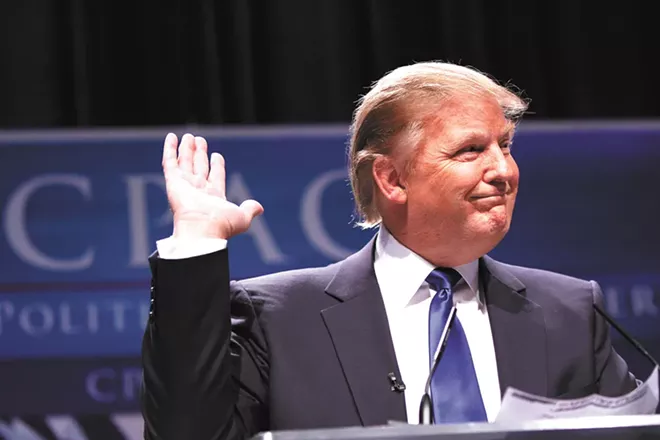Friday, November 11, 2016
ON INLANDER.COM
• NEWS: Trump's victory comes with an asterisk from Spokane. The president elect earned 48 percent of the vote here, which is less than George W. Bush in 2004, John McCain in 2008 and Mitt Romney in 2012. Clinton earned 42 percent, but 10 percent of Spokane County voters chose neither.
• MUSIC: Sturgill Simpson's alt-country sound blasted the Knitting Factory. Here's our review.
• FOOD: A shiny new retro donut shop in North Spokane.
IN OTHER NEWS:
• Protests over this week's election turned violent in Portland, Oregon. Police called it a riot. At least 29 people were arrested, according to news reports. Protests in Los Angeles, Philly, Denver, Minneapolis, Baltimore, Dallas and Oakland continued as well. CNN reports that about 185 protesters in LA were arrested last night.
• Fueled by Tuesday's election of Donald Trump, students across the country have been caught on video chanting "white power" and "build the wall." Pictures of racist graffiti also surfaced, including spray paint on the back of a baseball dugout near Wellsville High School in New York that reads: "Make America White Again" with a swastika. Demonstrations at WSU were "loud but peaceful."
• David Earl Hutto is now facing murder charges in the death of William "Bo" Kirk, who was shot and killed in Kootenai County last month. Prosecutors have said the encounter between Hutto and Kirk escalated from a road rage incident, but have been otherwise tight lipped. Only a portion of the case file is available to the public. (Spokesman-Review)
• Hip-hop group A Tribe Called Quest released their sixth and final album, We got it from Here...Thank You 4 Your service. Stream it here.
Tags: News , morning briefing , Image , Video
Thursday, November 10, 2016

In terms of his margin of victory, Donald Trump did better than Mitt Romney in Spokane County — beating Hillary Clinton this year by 6 percentage points as of Nov. 10. (Ballots are still being counted.)
But Trump's victory in Spokane County comes with a sizable asterisk. Spokane County is a solidly Republican country — 52 percent voted for Republican Josh Kerns for county commissioner despite Democrat Candace Mumm's city council experience and name recognition.
Yet Trump, unlike Romney in 2012 or Bush in 2004, couldn't crack 50 percent. He got 48 percent of the vote — slightly less than even McCain got in 2008. Clinton, however, pulled in less than 42 percent. But a full tenth of the Spokane County electorate who turned in ballots voted for neither.
We'll lump together all these votes — third-party votes, write-ins, and ballots with the presidential field left blank — and call them "protest votes." Since Washington state, like Idaho, isn't a swing state, it's not surprising that many unhappy voters would feel free to cast a protest vote.
Yet the protest vote level this year in Spokane County far outpaced the level in the previous three elections. Less than 4 percent of voters refused to support the Republican or Democratic nominee in 2012. And the protest vote percentage this year even doubled the percent of
Not only
In Spokane County, about 4.7 percent of voters chose Libertarian Gary Johnson, triple what the Libertarian Party got in 2012, and 11 times what it got in 2008. Libertarian votes barely even registered in 2004.
And as for the Green Party's Jill Stein? Her vote — 1.36 percent — was still pretty small, but still a lot better than the less-than-half-a-percent the Green Party got four years ago.
And how about write-ins? At least 3 percent of voters chose to write in their own candidate. In 2012, only 0.85 percent did. Meanwhile, over 1 percent of voters who turned in their ballots just flat out left their ballots blank, nearly double the rate in 2012.
Nationally, third parties did better than they've done in two decades. Even in Trump-friendly Idaho, 13 percent of voters refused to vote for either Trump or Hillary, with 7 percent casting their vote for independent candidate Evan McMullin.
Contrary to a few polls taken during Trump's nadir, McMullin didn't win Utah. But the conservative Mormon candidate still managed to pull over 20 percent in the heavily Mormon state. Not bad for a political unknown.
Tags: Election 2016 , Third parties , write-ins , News , Image

The votes are in and the election is over. The 2016 president-elect is Donald Trump, who will be the leader of the free world for the next four years.
In this year's extremely contentious and long election cycle, the American electorate is more divided than ever. Although many individuals are celebrating Trump as their candidate of choice, many others are grieving over what a Trump presidency may mean for them and their families.
The question of "what happens now?" seems to be particularly prominent among young people. Their answer seems to be inexplicably linked to fear for America's future. On Twitter, a viral collection of tweets titled "Day 1 in Trump's America" illustrates some of the alarming concerns his election has triggered.
Tags: election 2016 , Hillary Clinton , Donald Trump , protest , News , Image

As a small group of supporters of Donald Trump waved an American flag, a throng of protesters chanted at them on Wednesday afternoon at Washington State University.
Protesters carried signs that said, “Not My America” or “Not My President.” Trump supporters reveled in his victory, engaging in a loud but peaceful back-and-forth with protesters.
“It’s amazing,” said James Allsup, president of the WSU College Republicans. “It’s a hard-knock campaign and I respect everybody involved in the process. I know how stressful it can be to work in politics… And how much it can hurt to lose. Hillary gave a great speech this morning and how we need to come together.”
As ballots continued to be counted, Whitman County appeared to be the only county in eastern Washington that voted for Democratic nominee Hillary Clinton. Late Tuesday, Clinton led Trump 48.6 to 44.1 percent in Whitman County. More ballots are expected to be counted on Thursday.
College voters preferred Clinton by a wide margin this election, according to the Pew Research Center analysis of votes, but she received a smaller share than President Obama did in 2008 and 2012. Many Clinton supporters on campus were stunned by the outcome.
“Our system’s broken,” said Quiara Johnson, a 20-year-old student in fashion merchandising and marketing.
Student Franklin Ramirez called Trump’s win “ridiculous,” and said Trump could not understand the struggles of the typical voter.
“A word of advice, get out there and take those offices,” said Ramirez, a senior studying psychology and criminal justice. “That’s the only way we’re going to see change … This is not the end. This is just the start of the fight.”
Sam Harris, a 21-year-old anthropology student, expressed no strong affiliations but watched the protest.
“I want to maintain the peace and make sure no one gets out of line,” he said.
ON INLANDER.COM
• NEWS: A grant that will allow Spokane to hire 48 new firefighters won't last forever. And then what?
• MUSIC: Sister act Dry and Dusty went on tour, learned a lot about themselves and are now back in Spokane. So see them this Saturday.
• CULTURE: How to train a puppy to guide the blind — one local teen will tell you.
IN OTHER NEWS:
• Sick and Tired: The Spokane City Council is scheduled to decide Monday how to reconcile the city's paid sick leave law after the passage of a statewide initiative with similar policies. Both the city law and the initiative require certain businesses to provide paid time off for illnesses. (Spokesman-Review)
• Puff Puff Passed: California, Massachusetts and Nevada legalized recreational weed this week, adding to the list of four states and the District of Columbia with laws already on the books. A measure to legalize in Arizona failed, and as of this morning the final word in Maine is still out, but the "Yes" vote is in the lead. North Dakota, Florida and Arkansas also passed medical marijuana ballot initiatives. (Washington Post, New York Times, Business Insider)
• 'Not My President': Thousands gathered across the country to protest Tuesday night's election results. Protesters in Seattle, Portland, New York, Boston, Chicago, Dallas, Oakland and elsewhere took to the streets to express their outrage over the country's new leader. Also, five people were shot in downtown Seattle last night. Police say the shootings were unrelated to protests. (Seattle Times)
• 'An American Tragedy': New Yorker editor David Remnick (and a little George Orwell) on the power of public opinion and what appears to be the ultimate test of "the strength, or the fragility, of American institutions."
"Trump was not elected on a platform of decency, fairness, moderation, compromise, and the rule of law," Remnick writes, "he was elected, in the main, on a platform of resentment. Fascism is not our future — it cannot be; we cannot allow it to be so — but this is surely the way fascism can begin." (New Yorker)
• 'Her Loss': And if you haven't read Lindy West's essay about the election, do it now. (New York Times)
Wednesday, November 9, 2016

The Downtown Spokane Partnership's President Mark Richard has an idea. Maybe not the sort of idea that will — or even can — happen, but a pretty Xtreme idea nevertheless.
"Here's my bold vision: That we would do it across the river. That's my bold vision," Richard says. "What I'm proposing we need to accomplish is something magnetic. Something that creates adrenaline. Something for folks from 12 to 82. From what I've seen, the zipline has an ability to do that."
To his knowledge, no other community has a massive zipline over an iconic river downtown.
"Think about creating that destination where all of a sudden people are suddenly are coming from outside — because they will. Because they will," Richard says. "There's nothing like it. If we were to do that over the river, you're creating this amazing adrenaline rush and view. It becomes attraction for out-of-towners."
Ideally, he'd like to see it in Riverfront Park itself.
"[But] if we go above the dam, we would have federal regulations that prohibit that," Richard says. "Thinking big: If we were below the dam, what if we were to connect Kendall Yards with the park in Peaceful Valley?"
But he's willing to consider options.
"My second option would be, let's do it right alongside the river," Richard says. "You build a tower structure that's kind of low key."
You'd still get the adrenaline rush of the zipline and the view of the river, he says, though you're not right on top of it.
He came up with this idea brainstorming with the Riverfront Park steering committee, helmed by Inlander publisher Ted S. McGregor. He also says he suggested extending the gondola through the entire park, from Kendall Yards to the Convention Center.
"Again, connecting Kendall Yards, the live-work-play... I love that idea," Richard says. "That is one I support."
He also suggests something that, at times, actually was on the Riverfront Park design documents, but has since been abandoned from the revitalization effort.
"In my mind we're missing something in terms of our delivery in something for our old adolescent or young adult," Richard says. "We closed down the skate park underneath the freeway for good reason. Let's build a dynamic wheel park in Riverfront Park and give these kids something to do."
At times, the Downtown Spokane Partnership has been at tension with the groups of kids who've irritated businesses by loitering downtown. But Richard can empathize with them.
"We have youth who hang out downtown. I used to hang out downtown when I was a teenager," Richard says. "Rather than having them hang around, let's build something for them. And quite frankly, in that design as it stands right now, unless you ice-skate or you like to ride on the ferris wheel or the merry-go-round, there's not much there for a twentysomething. Especially anything that's going to give you an adrenaline rush."
I note that these sort of suggestions are more radical, tubular and even Xtreme than I was used to from the Downtown Spokane Partnership.
"We need Xtreme if we want to have Xtreme positive results," Richard says.
Tags: Ziplines , Xtreme , Riverfront Park , Downtown Spokane Partnership , Mark Richard , News , Image
The Great Repudiation
Say it with me. Say it with me so many it times that it starts to feels real.
President.
Donald.
J.
Trump.
It was a repudiation of the conventional wisdom and, possibly, simply wisdom.
It was a repudiation of all those data wonks and polling firms and smart-set pundits who scoffed and mocked at Trump supporters' ideas that the surveys were "skewed," that you didn't need a ground game or a specific strategy or coherent policies to win.
Don't you see, Robby Mook? The ground game was in the people's hearts all along.
It was a repudiation of Democrats, who find themselves without the presidency, the House, the Senate, most state legislatures and — soon — the Supreme Court.
But it was also a repudiation of Republicans, some of whom stood up against Trump in vain, and others who sold away their belief system — free trade, small government, moral values, opposition to Russia, defense of NATO — for a deal with the Donald.
It was a repudiation of the liberals who cynically rooted for Trump over candidates like Marco Rubio because he Couldn't Possible Win and he'd Take the GOP Down With Him.
It was a repudiation for the Democratic party operatives who cleared the field for Clinton, despite all her flaws and likability problems, with the assumption that It Was Her Turn. It was a repudiation for Dems who assumed that Bernie Sanders' message of white working-class populism made him unelectable, only to see a message of white working-class populism win the election.
It was a repudiation of the idea that voters don't really care about Email Server Management.
It was a repudiation of the general rule that you shouldn't spend so much of your campaign budget on hats.
Tags: Morning Headlines , News , Image
ANALYSIS
We could have been talking about how women, and the 168-year-long spirit of the suffragette movement, carried Hillary Clinton over the finish line — a historic victory that would break the thickest glass ceiling in the world. The raw emotion and political intensity of those women would have been a power never before seen in American politics — the power of the pantsuit writ large all across the Electoral College map.
We could also have been talking about how, over the past 17 months, we watched as Donald Trump stormed the cockpit, sent the experienced pilots back to
And around 11:30 pm Tuesday night, just as this newspaper was going to press, Hillary Clinton conceded after the Associated Press called the election. Donald Trump will be sworn in as president come January. Here’s a look back at a campaign we’ll never forget.
Clinton played her Woman Card, and that card had two sides — both powerful in their own way.
In the end, women came out for Hillary Clinton in big numbers — but not quite as big as expected. Not only were the majority of her
The polling was way off, and that will be a big story in the days to come. Polls leading up to Election Day showed a Clinton lead bigger than the one President Obama had over Mitt Romney in 2012. It seemed like the election would be competitive, but not close. Then results started rolling in. Florida fell to Trump. Then Ohio. And North Carolina. The dream of taking the Senate died, and Pennsylvania — Clinton’s firewall state — went to Trump, and soon after the White House with it.
You could say that Election 2016 was about the split between urban and rural America, but you could also say it was about gender. While Clinton won women by 12 points, Trump won men by 12. In the end, lots of women came out to support their candidate, but not quite as many as they had hoped. It wasn’t enough.
Trump, meanwhile, proved all the conventional political wisdom in the world wrong. Turns out, you can tell voters that, “This country is a hellhole” and get elected president. You can say the dictator of Russia is a better leader than America’s president and get elected. You can lie constantly, as documented by armies of
Trump seemed a particularly vulnerable opponent for a
Eventually, Trump turned his misogyny on Clinton, questioning whether a woman would have the stamina to be president, calling her a “nasty woman” and even judging her sex appeal at one point. None of these tactics earned him any support from women — but, perhaps, it may have drawn enough men to Trump’s take-no-prisoners manliness.
Without anything resembling a traditional campaign apparatus, Trump overcame his many shortcomings as a candidate. He lost all three debates and barely understood key issues — as recently as last month, he didn’t even know how the Affordable Care Act worked. His refusal to release his taxes was disqualifying for many voters. Not knowing that Russia invaded the Crimea and his pallin’ around with Vladimir Putin sent the foreign policy establishment (mostly conservatives) running across enemy lines to the Clinton camp. Patriotic voters were alarmed when he claimed that our military is “a disaster” and John McCain was not a hero, and when he wondered why we have nuclear weapons if we don’t use them.
There’s no way around it; roughly half the population woke up to
This campaign also revealed a lot about the voting public. In our self-absorbed Facebook culture, people don’t listen to each other much, and rational arguments don’t seem to work. We can’t even agree on facts — Trump never could accept that unemployment is below 5 percent, that incomes are growing and that crime is down.
America is in a great state of disconnect — from each other as we stick to our own tribes, and from facts that could guide and unify us. If there’s any common ground to start fresh on, it’s that America has spoken. And President Obama is living proof that, sometimes, we learn to live with presidents we weren’t so sure about early on.
On Monday, basking in public approval a point higher than Ronald Reagan’s at the same point in his tenure, Obama addressed a huge crowd outside Freedom Hall in Philadelphia — a state that Trump would win a day later. “I still haven’t given up on hope,” Obama said. “I’m betting that the wisdom,
Every four years, we all have to hope that’s a winning bet.
Tags: election 2016 , clinton , trump , News , Image
Tuesday, November 8, 2016
Ever since Todd Mielke left the Spokane County Board of Commissioners in January, the Spokane GOP’s main priority was keeping a Democrat from taking the seat come November.
While there are ballots yet to be counted, it appears that they succeeded, though without the candidate they initially thought would win the seat. Republican Josh Kerns is beating Democratic Spokane City Councilwoman Candace Mumm by a roughly 52 to 48 margin, according to preliminary results Tuesday night.
“I’m thrilled and I’m humbled by the support from the voters of the county,” Kerns said Tuesday night.
Mumm did not expect Kerns to be her opponent in the general election. In February, Spokane County GOP precinct committee officers appointed former Spokane City Councilwoman Nancy McLaughlin to fill the seat vacated by Mielke. The thinking, for many, was that she would have the best chance to keep the seat in November. Kerns, a legislative aide for state Rep. Jeff Holy, was the precinct committee officers’ second choice at the time.
But McLaughlin, facing a challenge from Mumm on the left and Kerns on the right, lost in the primary election — a result that stunned many, including Mumm, who said she was surprised that someone with “no political or elected experience would be my
Before Tuesday, Kerns employed the same strategy against Mumm that he used against McLaughlin: challenging her record as a city councilwoman. He criticized Mumm, who portrayed herself as a moderate Democrat, for supporting a sick-leave ordinance requiring businesses to pay for up to five sick days each year, and for helping pass a resolution to put a measure on the ballot to fine railroads for sending oil and coal trains through Spokane. (She later voted to take it off the ballot.) Mumm, meanwhile, questioned Kerns’ relationship with far-right Spokane Valley state Rep. Matt Shea, specifically how Kerns would support law enforcement as Shea and Sheriff Ozzie Knezovich continue their years-long public feud.
Kerns, who made bringing jobs to Spokane his priority, says he can promise that he will not support the same regulations as the city that, he says, hurts businesses.
“I am going to be someone who’s out there making sure we keep Spokane County as business-friendly as possible.”
Mumm, while not yet ready to concede the election Tuesday, guessed Kerns’ strong numbers may reflect the strength shown Tuesday for Republicans in the rest of the county. And while her campaign focused, in part, on coordination with the county and city of Spokane especially when it comes to land-use issues, and smarter planning for development of neighborhoods, she doesn’t think a loss kills that goal.
“I think I can still accomplish that whether I’m on the city council or on the county commission,” Mumm says.
With Kerns leading by just under 5 percent Tuesday night, the other Republican on the ballot for county commissioner, Shelly O’Quinn, celebrated a much wider margin of victory over challenger Andrew Biviano.
Tuesday’s results had O’Quinn leading Biviano with a 21-point margin and 60 percent of the vote, mirroring her win over Biviano in the primary. She expected a slightly tighter race in the general election.
“I didn’t expect it to be that high, but I’ll take it,” O’Quinn says.
She credits some success to not taking the election for granted and not making assumptions.
“[O’Quinn] should feel good about the fact that people seem to think she’s doing a good job,” Biviano says.
Biviano, an attorney, pushed for faster criminal justice and mental health reform in the county, arguing that his experience in those areas is greater than O’Quinn’s. He hopes that the county will have more urgency in addressing those issues in the future.
O’Quinn, who won her seat on the county commission in 2012, has touted her ability to save the county millions annually through lean management practices. She says she’s worked hard over the past four years, and she’s looking forward to what she can accomplish in the future:
“I have a couple great projects — I’m definitely looking forward to taking all of the work in the criminal justice system to the next level.”
Tags: County Commission , Spokane County , News , election 2016 , Image

Initiative 1433: Raising the minimum wage
There was a time that this initiative, which would gradually raise the minimum wage to $13.50 an hour and mandate a generous statewide mandatory sick-leave policy, would have resulted in a titanic battle between progressive activists and business groups. That’s what happened in the small city of SeaTac, south of
This time, the goliaths on the side of Initiative 1433 showed up to battle — including billionaire Nick Hanauer and a flood of union cash — but the business groups barely made an effort to fight back.
It easily marched to victory, with nearly 60 percent supporting it, according to initial results.
The Washington city driving the initiative the hardest, however, will largely be unaffected.
In 2014, the Seattle City Council passed an ordinance gradually hiking the city’s minimum wage to $15
It’s one reason that local Republican Sen. Michael Baumgartner, who is very critical of the initiative, acknowledges that minimum-wage opponents have “a little bit of a ‘Boy who cries wolf’ aspect.” The impacts of minimum-wage hikes typically aren’t apocalyptic. They’re
subtle.
Of course, Seattle, with its high-tech and port-based economy, is a long way from Spokane County’s more modest economy, where a quarter of all jobs are currently under the new wage threshold. In Spokane, voters decisively rejected the initiative, with more than 54 percent of voters voting “no.”
Seattle also doesn’t have to compete with Idaho. If Idaho or the federal government doesn’t hike its minimum wage by the time the wage climbs to $13.50, businesses in Liberty Lake will have to pay their minimum-wage workers 85 percent more than those in Post Falls.
It also renders the big fight earlier this year over the city of Spokane’s sick-leave policy — with all its hours of debate and consideration given to every exemption and detail — almost academic.
By 2018, when I-1433 goes into effect, a much more generous sick-leave policy will take hold, one that provides no exceptions.
Initiative 732: The carbon tax
It started out as an item on almost every climate wonk’s wish list — a shift in the tax burden to penalize big carbon tax emitters. But the fight over the nitty-gritty details quickly turned into a liberal civil war, with detractors on the left arguing that the carbon tax did too little, and cutting other taxes to make the measure “revenue neutral” set the stage for failure. It was the biggest state initiative failure of the night, bringing in less than 42 percent of initial returns.
Initiative 735: Moving to amend the U.S. Constitution
This initiative didn’t promise do anything directly to combat the impacts of the Supreme Court’s 2010 Citizens United
Initiative 1464: Campaign finance reform
Beyond introducing numerous new restrictions on PACs and lobbyists, this initiative — sponsored by City Council President Ben Stuckart — intended to close a tax loophole in order to hand Washington state residents three $50 “democracy credits” to freely spend on candidates of their choice. But the notion of giving more taxpayer money to politicians didn’t persuade most Washington voters: Over 52 percent of voters opposed the measure, while less than 48 percent supported it, according to preliminary vote totals.
Initiative 1491: Keeping guns out of the hands of dangerous people
Despite its occasional flirtation with elements of libertarianism, Washington hasn’t been afraid of passing statewide initiatives to restrict firearms, like I-594, which expanded background checks two years ago. This initiative will allow a court to issue temporary bans against owning or purchasing firearms for people considered an “extreme risk” to themselves or others. For voters, it was a no-brainer: 71 percent supported it.
Initiative 1501: Punishing identity theft/restrict anti-union groups
How did an initiative with an innocent name like the “Washington Increased Penalties for Crimes Against Vulnerable Individuals measure” draw opposition from nearly every newspaper editorial board in the state?
increasing penalties for identity theft was simply a Trojan horse for the real point of the initiative: Restricting the state Public Records Act to prevent anti-union groups from informing in-home caregivers that they don’t have to pay union dues. Swarmed by other initiatives, voters didn’t hesitate to approve the measure, voting for it in the biggest landslide of the night, with nearly 72 percent in favor.
Tags: Initiatives , Minimum Wage , Guns , Money , News , election 2016 , Image







